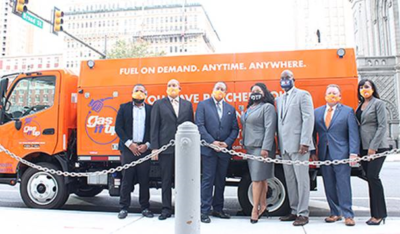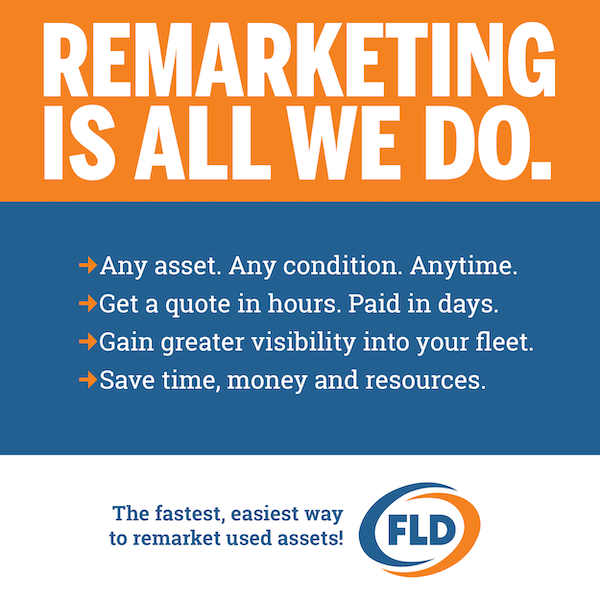
Photo courtesy of Gas It Up
By Ed Pierce, Contributing Editor
The benefits of diesel wet hosing, also known as mobile fueling, fleet fueling, or on-site fueling, are well-known by fleet managers that operate large fleets of trucks for their daily operations.
The most significant advantage of wet-hose fueling is the significant potential time and financial savings derived from the elimination of fuel storage on company grounds, more data-driven and responsive decision-making, and increased driver productivity.
Gas It Up Brings Wet Hosing Benefits to Gasoline Fueling
With recent changes in international fire code regulations, gasoline wet-hose fueling is beginning to take hold, spurred by the desire to reduce COVID-19 exposure through the handling of gasoline pumps.
Gas It Up leads the gasoline mobile fuel delivery market, offering a proprietary app developed by founder and president Victor Rodriguez in collaboration with fire marshals and fire departments. The mobile fueling tool launched just this past fall in Dallas, New York, New Jersey, and Philadelphia. The company plans aggressive expansion into new markets across the country in the coming months.
While Gas It Up competes with other regional players in offering wet-hose gasoline fueling to consumers, its innovative technology uniquely serves the fleet industry. The company can uniquely serve as a single-source mobile fueling provider for fleets with a mix of cars and trucks since it already offers diesel wet-hosing.
Kevin Fisher, vice president of Strategic Fleet Operations, points out that Gas It Up is, at its heart, a technology-based company: “We have an app for the desktop, iPhone, or Android designed expressly for the mobile fueling business. It brings refueling into the future and safely delivers top-quality fuel directly to consumers.
“Our desktop application features a business panel that automates fleet fuel management tasks such as fleet list transfers and other critical fleet profile and fleet fueling details. Of course, it makes ordering simple for immediate fulfillment.”
Fleet Expertise Make Gas It Up Unique
As a former fleet manager, Fisher managed fleets utilizing diesel wet-hose, and he brings first-hand knowledge of how mobile fueling can positively impact fleet operational efficiency and productivity.
“Companies that operate fleet vehicles expect comprehensive data, real-time visibility, and savings of both time and money,” says Fisher.
“Gas It Up uniquely brings digital advances that automate manual processes and transactions. We can complete credit card transactions at the fueling site; schedule fleet fuel deliveries during off-hours when drivers aren’t using them; report on salient fuel management performance, and reduce fuel administrative burden,” he reports.
Fleet Market Acceptance
Despite just launching the gasoline wet-hose service this past fall, Gas It Up has already found early success. Fisher likened Gas It Up to a gas station on wheels complete with credit card or ACH transaction processing. The cost savings value proposition inherent in an automated mobile fueling program for fleets is compelling. The ability to reduce the risk of infection for employees from gasoline pump handle exposure is suddenly paramount, too.
“We now deliver fuel to several ambulance companies each night of the week,” notes Fisher. “These companies report that our program is helping make the ambulance drivers more productive during the day. It also keeps these front-line employees safe by reducing the chance of infection from a non-healthcare-related task.”
A new market opportunity has arisen among car dealerships, reports Fisher. The Gas It Up mobile gasoline wet-hose service ensures fuel consumption control and management that dealerships require. Salespeople are more productive since they don’t have to leave the dealership premises for fuel. Finally, they don’t expose vehicles to traffic collisions.
“Another market niche with high potential is last-mile delivery,” says Fisher. “We have already made some early inroads here,” explains Fisher. “We can help eliminate a 15- to 30-minute fueling trip to the gas station that adds unnecessary driver stops and excessive mileage for the vehicle.
“As the past year’s pandemic has shown, the need for last-mile service fleets is growing at an exponential rate,” notes Fisher. “Gas It Up wet-hose fueling eliminates the need to store fuel on company grounds, so there is no need for companies to deal with the environmental and safety concerns associated with on-site fuel tank storage.”
The Gas It Up Fleet Profile
Gas It Up ‘s own fleet is growing in step with its market expansion plan. It includes Ford F-250s, upfitted with four 100-gallon tanks. These served as developmental vehicles and continue to be used for consumer fueling.
Under regulations of the International Fire Code, Chapter 5707, Gas It Up is limited to a 1,200 gallon-capacity tank for wet-hose gasoline fueling.
For diesel wet-hose fueling, the company utilizes vehicles with 2,800 gallons, 3,000 gallons, and 5,000 gallons to meet different state and bridge laws.
“In support of our diesel growth and customer demand, we are actively spec’ing vehicles to dispense DEF fluid right out of the truck,” adds Fisher. “We expect to serve a growing number of fleet customer requests for overnight diesel and DEF fluid delivery.”
All Gas It Up trucks feature redundant safety systems. These include an interlock system that prevents loading or unloading fuel unless the braking or parking brake set, transmission, and pumping components are set. Finally, the vehicles are equipped with wheel tracks and cleanup kits to avoid any potential incidents or even fuel drops.
Wet Hose Gasoline Fueling Regulations
Gas It Up adheres to important stipulations concerning fueling locations. Specifically, fueling must occur outside of a 25-foot perimeter of any buildings but not within five feet of a roadway. The company often uses large parking lots, e.g., shopping malls, office complexes, and other open lots for fueling.
“During the startup week, we demonstrated wet-hose gasoline fueling in front of Philadelphia’s City Hall,” says Fisher. “Then, we went to a local hospital, where we fueled the vehicles of administrators, nurses, and doctors. The hospital staff immediately recognized the value of mobile fueling to lessen the risk of COVID-19 infection by not having to handle gasoline pumps.”
Diversity Spend Opportunity
As a certified Minority Business Enterprise and Diverse Business Enterprise, Gas It Up has received numerous inquiries from companies looking for ways to increase their minority spend. Some even seek admittance to the Billion Dollar Roundtable that recognizes corporations that achieved spending of at least $1 billion with minority and woman-owned suppliers.
“Fuel certainly qualifies as a significant diversity spend opportunity,” says Fisher, “and we can help businesses increase their diversity spectrum.”
Final Thoughts from an Experienced Fleet Executive
Having managed fleet operations, including fuel management programs for fleets with hundreds, even thousands, of vehicles, Fisher sees tremendous opportunity for Gas It Up to serve the growing demand for cost reduction and increased productivity, especially after the disruption of the pandemic:
“If you can find a new area of efficiency in operating a fleet, go for it! I saw the efficiencies involved in diesel wet-hosing, and now fleets can apply those same efficiencies and labor savings to the gasoline fleet!”




